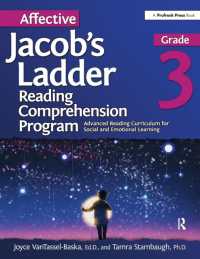- ホーム
- > 洋書
- > 英文書
- > Psychology
Full Description
How do individuals conceive illness and symptoms? Do their
conceptions conflict with the physician's views of their
illness, and what happens if they do? This book thoroughly
explores the field of disease representation, describes and
discusses lay illness models in a variety of social, histo-
rical and cultural contexts.








